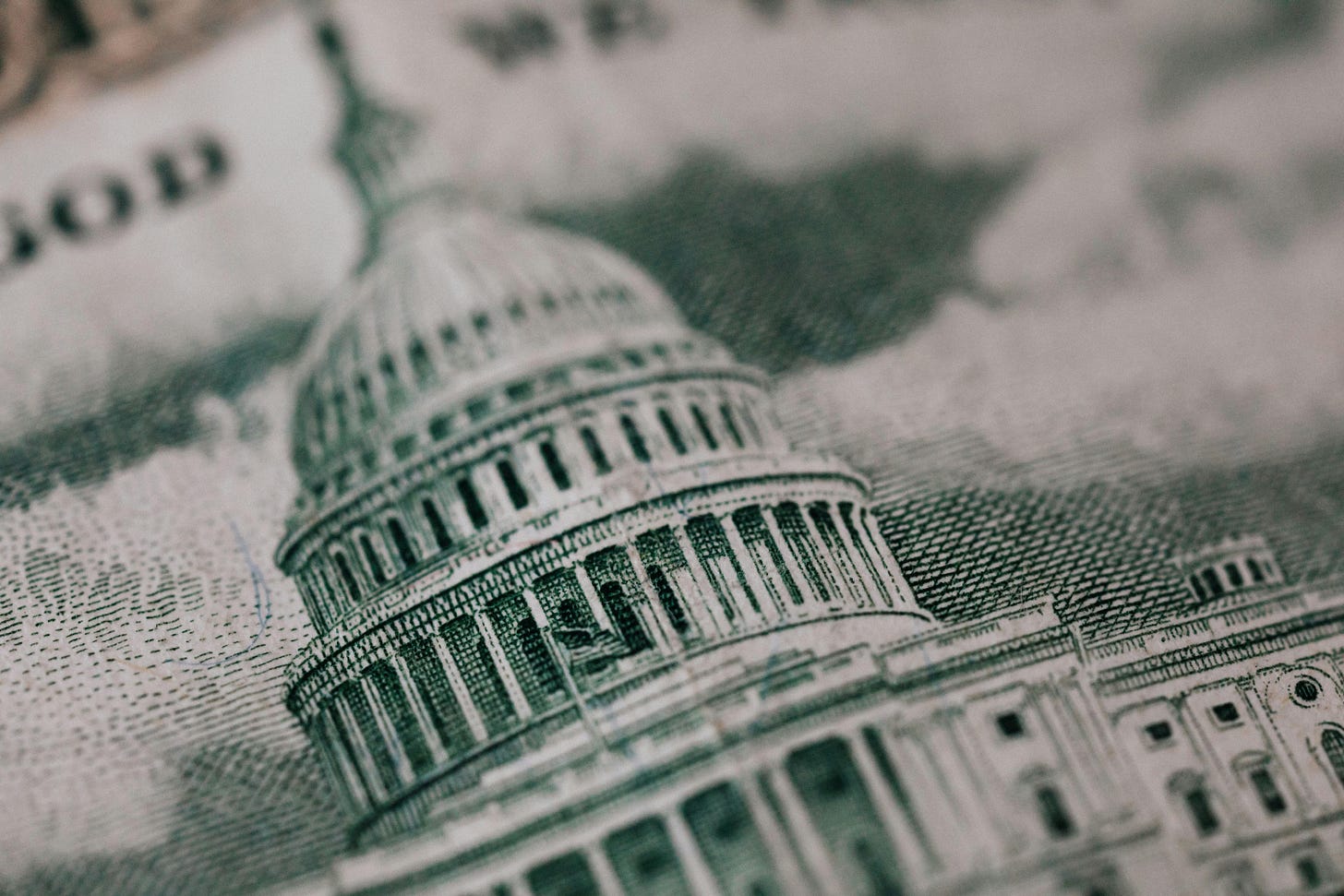More Tariffs, More Problems? | This Week's Economy Ep. 103
Examining Trump tariffs, Texas school choice, and institutional investors in housing.
Hello Friends!
It’s about time Washington took our nation’s spending crisis seriously! The House narrowly passed a continuing resolution to avoid a partial federal government shutdown (so close! ha!). Meanwhile, Elon Musk and Senator Lindsey Graham highlight concerns about Social Security spending and insolvency. These are positive steps, but politicians in D.C. and across the country must take meaningful action to spend less, make TCJA permanent, deregulate, and ultimately get government out of the way.
This week, I dive into the federal funding debate, Social Security, the costs of tariffs, school choice chances in Texas, Trump’s energy policy, the new Labor Secretary appointment, and institutional investors’ impact on housing.
Catch the full episode on YouTube, Apple Podcast, or Spotify, and visit my website for more information.
Timestamps
00:00 Government Funding and Economic Growth
03:27 Trade Wars and Tariffs Impact
07:19 School Choice in Texas
09:41 Social Security and Fiscal Crisis
11:57 Energy Policy and Independence
13:48 Labor Policy and Government Interference
15:12 Housing Market and Rental Policies
1. GOVERNMENT FUNDING BILL

In the News:
As a potential government shutdown loomed, the House narrowly passed a stopgap measure to fund the government through September. As of this recording, Senate Democrats have stated they will not support the House bill but are advocating for a stopgap measure to keep the government funded until a clean continuing resolution can be passed. Sources: NBC News, WSJ, and Fox News
My Take:
Spending Must Be Addressed: Americans are calling for more economic growth, and to achieve this, we must address the federal government’s overspending problem. Congress must take action. While the House’s continuing resolution bill extends federal spending with the hope of curbing spending thereafter, more must be done. The Trump administration should also push lawmakers to make deeper spending cuts without sacred cows and include the reductions proposed by DOGE.
More Cuts Needed: The House spending bill includes increasing “military spending by $6 billion and cuts nonmilitary spending by $13 billion. It prevents the renewal of earmarks that had funded programs such as $294 million in Federal Emergency Management grants for disaster preparedness and mitigation. It also cancels Washington, D.C.’s fiscal 2025 budget of $21 billion, forcing the district to cut $1 billion in spending, most of which is funded through local taxes.” More significant cuts are necessary to address economic issues like inflation effectively.
End the Habit of Continuing Resolutions: Passing stopgap measures and continuing resolutions has become the standard approach for Congress in addressing the budget. But it’s time for a change. This shift will pave the way for making the Tax Cuts and Jobs Act permanent, ensuring lower tax rates for both corporations and individuals, with the broadest base possible.
Related: Here’s what I said on federal spending and what Congress should do in my conversation with NTD News.
2. GOAL OF TRADE WAR

In the News:
President Trump has threatened to double the tariffs on Canadian steel and aluminum imports, raising the tariff rate to 50%. Despite Trump's claims, these tariffs will likely hurt American jobs and industries. Meanwhile, House Republicans are actively working to shield President Trump from challenges on tariffs from Congress. Sources: BBC News, Politico, and CNBC
My Take:
Bad Policy: Tariffs on neighboring nations, particularly Canada, are a misguided strategy that will likely backfire. They act as a tax on American consumers and disrupt vital trade routes. Doubling tariffs on Canadian steel and aluminum would raise costs for American manufacturers, harm industries relying on these materials, and threaten jobs. This risks damaging a key economic relationship with Canada, our closest trading partner.
Questioning the Goal: What is the goal of this trade war? Is it to achieve free trade with zero tariffs, balance trade deficits, raise taxes for increased spending, or threaten foreign leaders? It’s essential to clarify the intended outcome of this policy.
Free Trade is the Solution: As it was during Trump’s first term, the goal should be to reach zero tariffs. Instead of tariffs, we need policies that promote U.S. innovation, reduce regulations, and avoid price hikes. We need fiscal and regulatory reforms to revive manufacturing, not import taxes. To strengthen the economy, we should focus on free trade and pro-growth policies, not government barriers that harm consumers and disrupt supply chains.
Related: I recently shared the harmful impact of these tariffs in my commentary at DC Journal.
3. SCHOOL CHOICE IN TEXAS

In the News:
As a top priority of the 89th Texas Legislature, the House Committee on Public Education held a passionate debate last week during a more than twelve hour hearing. I had the opportunity to submit written testimony on HB 3, a bill to expand school choice in Texas. Source: ABC 13 News
My Take:
Fix Funding Problems: Texas’ government school finance system is overfunded and broken. The state spends nearly $95 billion annually on K-12 education, but student outcomes continue to decline. Since 2013, per-student spending has risen 48%, while 8th-grade math proficiency has dropped 40%. The issue isn’t funding—it’s a bureaucratic monopoly. Instead of more funding, we need competition, as too many bureaucrats and high salaries are keeping students trapped in failing schools.
Taking a look at HB 3: HB 3 expands school choice, but Texas must go further. It introduced education savings accounts, allowing families to choose the best education. However, it only covers 1.5% of students, leaving 90% trapped in the system. Texas needs universal school choice.
Improving HB 3: Texas students deserve better. HB 3 is a step in the right direction, but the state must go further to fund students, not systems. The Texas House should pass HB 3—but make it universal and less restrictive. They should reject HB 2—no more money for the broken system. New spending is unnecessary—schools are already overfunded.
Related: I recently shared my thoughts …
4. DOGE LOOKS AT SOCIAL SECURITY

In the News:
Elon Musk has brought Social Security into the DOGE conversation, highlighting government waste and fraud within the “entitlement” program. With concerns over insolvency, U.S. Senator Lindsey Graham advocates raising the age to collect Social Security benefits. Meanwhile, a new rule from the Social Security Administration aims to address the billions lost in overpayments. Source: AP, Yahoo News, and CNBC
My Take:
Adding to the Fiscal Crisis: It’s time to examine Social Security closely. The trust funds for Social Security and Medicare are expected to run dry in the next decade. These large progressive programs contribute to America's federal spending crisis, draining the economy through high taxes and less savings. Something must be done.
Facing Insolvency: Without reforms, these programs will face massive cuts by 2036, and they will be unable to pay 100% of expected benefits. Congress must address these programs before they become a greater burden through higher taxes and increased government spending. These programs are entrenched, but we are not entitled to them.
Raise the Age: I support ending Social Security for those at least under 55, giving people time and incentive to save and find health insurance independently, rather than being forced to fund costly government programs. As Senator Graham suggests, the retirement age should be raised to match life expectancies of around 80. We need to confront the facts about these costly programs. If we want to keep them, significant reforms are necessary—regardless of political views.
Related: In a previous episode of This Week’s Economy, I explored the issues with Social Security and why addressing these concerns is crucial.
5. ENERGY POLICY IMPROVEMENTS

In the News:
President Trump’s Energy Secretary Chris Wright vowed to reverse Biden-era climate policies, as the administration shifts focus to “unleashing American energy'“ as a key priority. Source: Fox News
My Take:
Restore Energy Independence: Energy independence was a key focus of Trump’s first term and remains central to his second. Upon returning to office, Trump declared a national energy emergency. While this may not have been necessary, it paved the way for quick regulatory reform.
Undoing Harmful Biden Legacy: It’s promising that Energy Secretary Chris Wright is committed to reversing Biden’s harmful regulations. As part of this work, the administration should open federal lands for oil and gas exploration, fast-track pipeline and refinery permits, and eliminate green energy subsidies to lower costs, create jobs, and strengthen national security. These actions would lower energy costs, create high-paying jobs, and strengthen national security.
Free Market Energy Vision: A free-market energy policy will stabilize prices, reduce reliance on foreign powers, and foster a competitive market. By cutting taxes and regulations, America can support strong businesses, workers, and families.
Related: Daniel Turner and I compared and contrasted the energy policies of the Biden-Harris and Trump administrations. The discussion is below.
6. FUTURE OF LABOR POLICY

In the News:
Former Representative Lori Chavez-DeRemer was confirmed as President Trump's Labor Secretary. Chavez-DeRemer, whose father was a Teamsters member, underscores Trump’s efforts to position himself as pro-worker and challenge the Democrats' long-standing alliance with organized labor. Source: Axios
My Take:
Point of Concern: I am concerned about Labor Secretary Chavez-DeRemer’s potential push to increase government interference in voluntary exchanges between employers and employees.
Closing the Department of Labor: Reports suggest that DOGE may target the Department of Labor, offering hope for a shift. Secretary Chavez-DeRemer should work toward closing the department.
Supporting Workers: Championing free-market policies is the best way to help workers. We can create a thriving economy that benefits workers by removing regulatory burdens on businesses and allowing Americans to keep more of their hard-earned money.
Related: Listen to my discussion with Liya Palagashvili on the future of work and better labor policy.
7. WAR ON RENTAL HOUSING
In the News: Lawmakers in Washington and Texas are proposing bills that target professional ownership of single-family rentals. They claim that institutional investors drive up housing costs and make homeownership unattainable. However, data from leading economic institutions suggest otherwise. The real issues behind rising housing costs are overregulation, high property taxes, and outdated zoning laws—not responsible rental property investors.
My Take:
Small Investors, Big Impact – Institutional investors only own a fraction of single-family rentals, and many are small-scale operators, not corporate giants. These investors stepped in when home demand was weak during the pandemic, keeping the housing market moving when individual buyers hesitated.
Bad Bills, Bad Outcomes – Texas's HB 287 and SB 443 would penalize investors, leading to fewer rental options, higher costs, and displacement of families. Instead of solving affordability, these bills would worsen by shrinking supply and forcing renters into higher-priced markets.
Cut Red Tape, Not Opportunity – The real solution to housing affordability is reducing regulation, lowering property taxes, and allowing market-driven development. Austin’s rent prices dropped 22% after zoning reforms, proving that expanding supply—not restricting investment—is the right path forward.
Related : Want to learn more about how rental property investors are helping expand housing access, not hurting it? Watch the following podcast with Dr. Judge Glock.
Thanks for joining me in this episode of "This Week's Economy." For more insights, visit vanceginn.com and get even greater value with a paid subscription to my Substack newsletter at vanceginn.substack.com.
God bless you, and let people prosper!
Keep reading with a 7-day free trial
Subscribe to Let People Prosper to keep reading this post and get 7 days of free access to the full post archives.







